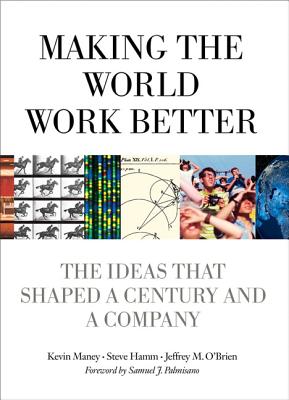International Business Machines, Making the World Work Better
July 01, 2011
Who knew that corporate history could be so beautiful? Just the name of the place, International Business Machines Corporation, makes it sound like a drab and soulless place, definitely gray. But IBM has a rich and colorful history, as the material they've been producing to celebrate their 100th year in existence makes abundantly clear.
Who knew that corporate history could be so beautiful? Just the name of the place, International Business Machines Corporation, makes it sound like a drab and soulless place, definitely gray. But IBM has a rich and colorful history, as the material they've been producing to celebrate their 100th year in existence makes abundantly clear.
Some of you may have seen the Errol Morris film They Were There online, which celebrates IBM's centennial. (If you're having a hard time placing the name, you may remember Morris from some of his previous work, such as A Brief History of Time and The Fog of War.) What you might not have seen yet is the gorgeous book IBM released last month, Making the World Work Better: The Ideas That Shaped a Century and a Company by Kevin Maney, Steve Hamm and Jeffrey M. O'Brien. And I don't use the term "gorgeous" flippantly; this is a thoroughly good looking, well-thought out and wonderfully written book. The book is split into three sections, with each author looking at different ways IBM has shaped our world over the past 100 years. "Pioneering the Science of Information" by Kevin Maney looks at how IBM changed the science and technology of the world, covering everything from the development of the bar code to the creation of "Watson," the computer that beat the all-time Jeopardy champions earlier this year. "Reinventing the Modern Corporation" by Steve Hamm looks at a different Watson, Thomas Watson Sr., and his "intentional creation of culture." It discusses how the culture and organizational structure he built and the values he instilled have shaped the company's history and how it has influenced others. Hamm has fascinating stories to tell in this section, such as IBM's integration of southern factories 11 years before the Civil Rights Act (done by Thomas Watson Jr. in the face of opposition from southern governors) and how it's continuing to lead the way in corporate responsibility—not just in regard to their employees, but to the communities they operate in and the world as a whole. The final essay, from which the book takes its title, is "Making the World Work Better" by Jeffrey M. O'Brien. Whereas Maney's essay describes how IBM's technology has changed the world and Hamm's details how the company's beliefs have influenced it, O'Brien delves into how their model and the power of its ideas have, well, made the world work better.
So many of the topics covered and sentiments expressed in the book are inspirational, beginning with those expounded upon on the forward by Samuel J. Palmisano, the Chairman, President and CEO of IBM, in the book's foreward. Speaking of Jeff O'Brien's essay, Palmisano writes:
Looking at the advances over the past century, Jeff uncovers a simple, intuitive and powerful model of progress. Today, that model is being renewed by our technology-powered capacity to see, map and understand vast amounts of new data about every dimension of both nature and society, opening up ways to make our world literally work better. And yet, these stories argue that acting—actually changing the complex systems of our planet in lasting ways—relies most fundamentally not on data but on belief. Our learning depends on a prior faith in our capacity to learn—as Thomas Watson Sr. often said, to think.
The lead actor through these narratives is a collective enterprise based on the power of ideas—their economic power, their galvanizing and structuring power, their transformational power. These are the ideas that drive progress—and by progress, I mean building a world that is not only more prosperous, more sustainable and fairer, but also better able to continually transform itself; a world that learns. Or, again, as Thomas Watson Sr. often said, to think. This book wouldn't exist without Watson Sr., without the values and culture he instilled in the company, without his son Thomas Watson Jr. who carried on and furthered that vision. In that sense, this is not simply a corporate biography, but also a reminder of the power we as individuals have to shape history. Making the World Work Better is also a reminder that the companies we build are healthier when they concern themselves not only with corporate growth and influence, but corporate beliefs and responsibility, as well.
And it is wonderfully designed reminder, chock-full of interesting photos and illustrations of the company's illustrious history. Here's just a taste:



Happy 100th, International Business Machines!


